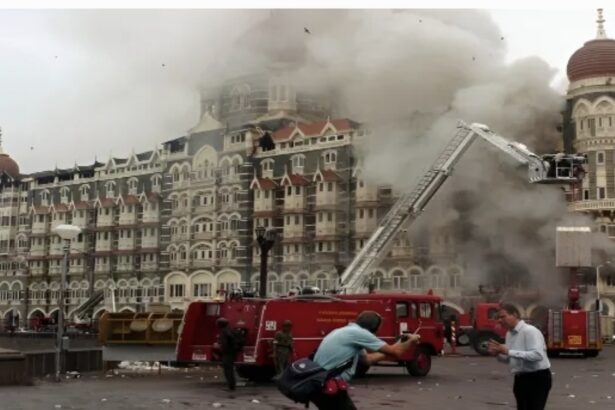Sixteen years ago, on 26 November 2008, India endured one of its darkest days when Mumbai, the city of dreams, became the epicentre of a devastating terror attack. The coordinated strike, carried out by Pakistan-based Lashkar-e-Taiba (LeT) militants, left the nation shaken leaving behind a trail of grief, resilience, and unforgettable heroism. As the nation reflects on this tragic anniversary, leaders and citizens alike come together to honour the 166 lives lost, the bravery of security personnel, and the enduring spirit of a country that rose stronger in the face of terror.
President Droupadi Murmu’s tribute
President Droupadi Murmu called the attacks a ‘cowardly act’ and remembered the bravery and sacrifices of the security forces who protected the nation during its darkest hour. In a heartfelt message shared on X (formerly Twitter), she reaffirmed India’s unwavering resolve to combat terrorism in all forms.
“On the anniversary of cowardly terror attacks in Mumbai on 26th November 2008, I join the entire nation in paying homage to the Bravehearts who lost their lives and expressing solidarity with their families. A grateful nation salutes its valiant security personnel who made the ultimate sacrifice while protecting our people. It is also the day to reiterate that India remains firmly committed to defeating terrorism in all its forms,” the President wrote.
Defence Minister Rajnath Singh: ‘We will never forget’
Defence Minister Rajnath Singh honoured the victims and the resilience of India’s security forces. “On the anniversary of the 26/11 Mumbai terror attacks, the nation remembers those who lost their lives that fateful day. We pay homage to the security personnel who fought with utmost courage and made supreme sacrifice in the line of duty. We remember, and we will never forget those wounds,” he said in a post on X.
Home Minister Amit Shah reiterates India’s resolve
Union Home Minister Amit Shah reflected on the tragedy, describing the attackers as cowards who “shamed humanity” by targeting innocent civilians. Shah paid tribute to the martyrs and reaffirmed Prime Minister Narendra Modi’s “zero tolerance” approach to terrorism.
“I pay my emotional tribute to the soldiers who attained martyrdom while fighting terrorists in the 26/11 Mumbai attacks and salute those who lost their lives,” Shah said.
He said the Modi government’s anti-terrorism policy has received global recognition, solidifying India’s leadership in the fight against terrorism. “Today, India has become a world leader in anti-terrorism initiatives,” Shah said.
26/11 terror attacks: A day that shook the nation
On 26 November 2008, ten heavily armed militants from the LeT terror group carried out a meticulously planned assault across multiple high-profile locations in South Mumbai. Arriving via the Arabian Sea, the attackers unleashed unprecedented violence, targeting sites including the Taj Mahal Palace Hotel, Oberoi Trident Hotel, Chhatrapati Shivaji Maharaj Terminus (CST) Railway Station, Leopold Cafe, and Nariman House, a Jewish outreach centre.
Surviving four days of terror
The 26/11 attacks, which spanned nearly four days, claimed 166 lives, including 18 security personnel and 26 foreign nationals, while injuring over 300 people. The attackers used automatic weapons and grenades to execute their mission, creating chaos and leaving the city under siege.
Key locations and timeline:
Chhatrapati Shivaji Maharaj Terminus (CST): One of the first sites attacked, where gunmen opened fire on commuters, killing 58 people.
Leopold Cafe: A popular tourist spot that witnessed indiscriminate shootings, leaving at least 10 dead.
Nariman House: A prolonged standoff ended with the deaths of six hostages and two attackers.
Oberoi Trident and Taj Mahal Palace Hotel: These luxury hotels became battlegrounds where attackers took hostages. The sieges at both locations ended on November 29, following intense operations by the National Security Guard.
Nine of the ten attackers were killed during the operations, while the lone survivor, Ajmal Kasab, was captured alive. Kasab was tried and sentenced to death in 2010. His execution was carried out in 2012.
Cross-border terror network
The attackers infiltrated by hijacking an Indian fishing trawler after departing Karachi on a Pakistani-flagged vessel. They landed near the Gateway of India using inflatable dinghies before splitting into teams to execute their attacks.
Subsequent investigations exposed the international dimensions of the plot. Pakistani-American terrorist David Headley, who scouted locations for the attacks, was arrested in 2009. Headley pleaded guilty in 2011 and was sentenced to 35 years in prison. Indian authorities also apprehended Sayed Zabiuddin Ansari, believed to have guided the attackers remotely.
India’s counterterrorism overhaul
The attacks exposed glaring vulnerabilities in India’s security infrastructure, spurring significant reforms. The establishment of the National Investigation Agency in December 2008 marked a pivotal step in bolstering India’s counterterrorism capabilities. Additionally, amendments to the Unlawful Activities (Prevention) Act empowered authorities with enhanced tools to combat terrorism.
Global significance and lessons learned
The 26/11 Mumbai attacks drew comparisons to the September 11, 2001, attacks in the US, highlighting the global nature of terrorism. While the scale of 26/11 was smaller, the incident emphasised the necessity for international cooperation to tackle transnational terror networks. The attacks galvanised efforts to enhance intelligence-sharing and coordination across borders. (ANI)
The post 16 years of 26/11 terror attack: India salutes bravery, remembers victims appeared first on Newswire.


